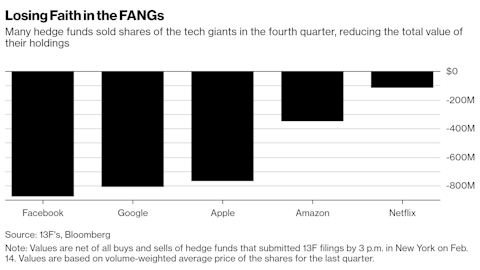Google‘s slogan has long been “Don’t Be Evil”, but the company’s actions have been anything but nice over the years, as the Alphabet Inc (NASDAQ:GOOGL) subsidiary has routinely crushed potential competition through questionable, self-serving methods.
New York Times columnist and best-selling author Charles Duhigg took aim at Google in a lengthy piece published yesterday titled The Case Against Google, suggesting that it may be time for the government to take action against the company, including the possibility of breaking it up. We’ll look at those arguments in this article and see how likely it is that Alphabet Inc (NASDAQ:GOOGL) be broken up into tiny bite-sized chunks.
At Insider Monkey, we track insider trading and hedge fund activity to uncover actionable patterns and profit from them. We track over 600 of the most successful hedge funds ever in our database and identify only their best stock picks. Hedge funds are like many other companies in that they bundle products (in this case, stock picks) together and sell them to customers (investors) as a package deal. That means you get their 73rd-best pick along with their best pick, and who wants to pay exorbitant fees for a fund’s 73rd-best idea when you could instead invest in only their best ideas? Our newest stock picks were released this month, which investors can gain access to by becoming a subscriber to Insider Monkey’s premium newsletters.
A History of Conquest: In the column, Duhigg cites multiple cases where companies with competing search engines or services were quickly snuffed out by Google before they could gain any traction, including Skyhook Wireless. In a 2010 lawsuit, Google was accused of decimating the navigation software company after pressuring Samsung and Motorola to terminate their contracts with Skyhook and remove the competing location software from their phones. Google was ordered to pay $90 million to the company in that lawsuit, though over a separate patent infringement claim and not the charges of strong-arming phone manufacturers.
Another such company was Foundem, a vertical search engine that could be used to find relevant answers to complicated questions that Google (a horizontal search engine) had trouble with. Just two days after Foundem’s public launch, the company’s search rankings on Google mysteriously plummeted (they were not affected on MSN or Yahoo) and its traffic all but disappeared overnight. The company’s founders contacted Google and others for months and got nowhere, despite their contacts in the tech world.
Google’s Search business is obviously extremely important to the company, as it generates close to 90% of its revenue despite the company’s growing list of other ventures. That revenue hit a record $31.91 billion in the fourth-quarter of last year, a 30% year-over-year rise. Those results pushed the company’s shares through the roof last year, as they rose by 26% to over $1,000 a pop.
Alphabet Inc (NASDAQ:GOOGL) Not Just Pushing Around Little Guys: Bigger companies like Getty Images and Yelp Inc (NYSE:YELP) have also suffered dramatically from changes to Google’s search engine; changes which have directly benefitted Google while slashing the traffic to those sites. In the case of Getty Images, the image aggregator site’s traffic fell by 85% overnight according to Getty general counsel Yoko Miyashita, after Google started allowing users to view and download the site’s images directly from its search engine.
Google also co-opted content from Yelp Inc (NYSE:YELP) into its search engine, which lead to users no longer needing to visit Yelp itself to see some of that site’s content. Yelp and other review sites like TripAdvisor and Citysearch have all complained to the FTC about Google, to little avail thus far.
Google’s argument is that by directly incorporating other sites’ content into its search engine, it’s improving the experience for its customers. However, at what point should Google be allowed to benefit its customers at the expense of other companies and where should the courts stand on this?
On the next page we’ll look at some of the other arguments for and against the growing power of Google and other tech giants like Apple Inc. (NASDAQ:AAPL), Facebook Inc (NASDAQ:FB), and Amazon.com, Inc. (NASDAQ:AMZN).
Follow Alphabet Inc. (NASDAQ:GOOG)
Follow Alphabet Inc. (NASDAQ:GOOG)
Receive real-time insider trading and news alerts
Antitrust Not Needed in the Tech Space?: It was long argued that antitrust wasn’t necessary in the tech space because of the ease with which startups could penetrate the market with a new service or technology and supplant existing tech giants.
Google itself was often cited as an example for being able to attain a dominant position in search despite competing search engines from other internet giants of the day, including Microsoft Corporation (NASDAQ:MSFT). However, just because some startups have had success in tough environments shouldn’t preclude regulation and oversight from being necessary, as if every company should just have to fend for itself against bigger, ruthless competition because a few others managed to do so and succeed.
What also isn’t as widely known in the Google case is how much of an effect that Microsoft Corporation (NASDAQ:MSFT)’s own antitrust battles had on the company’s ruthlessness. Even though Microsoft won the antitrust battle against the courts, it ultimately lost the war, becoming a company that was afraid to step on anyone’s toes for fear of regulatory reprisal.
Is the Tide Turning Against Tech Giants?: Such reprisal had been absent in recent years, as the Obama administration did little to curtail the rapid growth of several tech companies, including Apple Inc. (NASDAQ:AAPL), Facebook Inc (NASDAQ:FB), and Amazon.com, Inc. (NASDAQ:AMZN), who together with Google and Microsoft control the majority of online news, shopping, and advertising and are collectively valued at trillions of dollars, while all ranking among the 15 most popular stocks among hedge funds.
In the EU, Google was hit with a $2.7 billion fine last year and was ordered to stop giving itself an illegal advantage over other comparison shopping services. The EU has also embarked on antitrust investigations of Facebook Inc (NASDAQ:FB) and other companies, as well as looking into the tax practices of Apple Inc. (NASDAQ:AAPL) and Amazon.com, Inc. (NASDAQ:AMZN). The EU’s tough stance may serve to embolden the FTC, which has long had Google on its radar, as well as U.S lawmakers.
“Google’s conduct has resulted — and will result — in real harm to consumers and to innovation,” part of an internal FTC memo that was accidentally sent to The Wall Street Journal read.
Firm Antitrust Laws Needed to Foster Innovation: Some argue that Google’s activity isn’t directly harming consumers and therefore shouldn’t be regulated. However, it’s not a matter of how happy people are about the quality of Google’s Search engine, as Google itself seems to think is of prime importance. It’s about allowing competition to flourish and allowing consumers to make their own choices, not have a Search dictator control which sites or services can become popular, which is essentially what Google has become capable of, if it hasn’t already become just that.
People will say there are other search engines out there that one can use, that no one’s forced to use Google, but that’s entirely missing the point. The fact that some competition still exists doesn’t change the fact that Google now has monopolistic control over internet search that can and has been used against potential competition; competition which may have become even more popular than Google one day if it had a fair shot at reaching consumers online.
As Duhigg notes, antitrust is necessary for innovation and enforcing it shouldn’t even necessarily be about fairness. Even had Google played by the rules and still grown into a monopolistic entity, the need for it to be broken up would essentially be the same at this point. Because antitrust should be about promoting progress, something we as a society should always be aiming to achieve. When progress and innovation are allowed to be snuffed out by fearful competitors, whether directly or indirectly, we all lose out, our potential societal evolution held back.
It’s now a matter of seeing just how far U.S regulators will go as they finally take a closer, harder look at several growing tech monopolies, including Google.
“If Europe can prosecute Google, then we can as well,” William Kovacic, a law professor and former chairman of the FTC told Duhigg. “It’s just a question of willingness now.”
Hedge Fund Ownership of Alphabet Inc (NASDAQ:GOOGL): At the end of 2017, Google’s class A and C shares ranked as the fifth and sixth-most popular stocks among the hedge funds tracked by Insider Monkey’s database. 129 hedge funds were long Google’s class A shares, with 124 being long its class C shares. Those hedge funds owned a combined $34.8 billion of the company’s shares.
Several hedge funds own billion-dollar positions in Google, including Boykin Curry’s Eagle Capital Management ($1.71 billion), Ken Fisher‘s Fisher Asset Management ($1.16 billion), and Andreas Halvorsen’s Viking Global ($1.05 billion).
Disclosure: None






